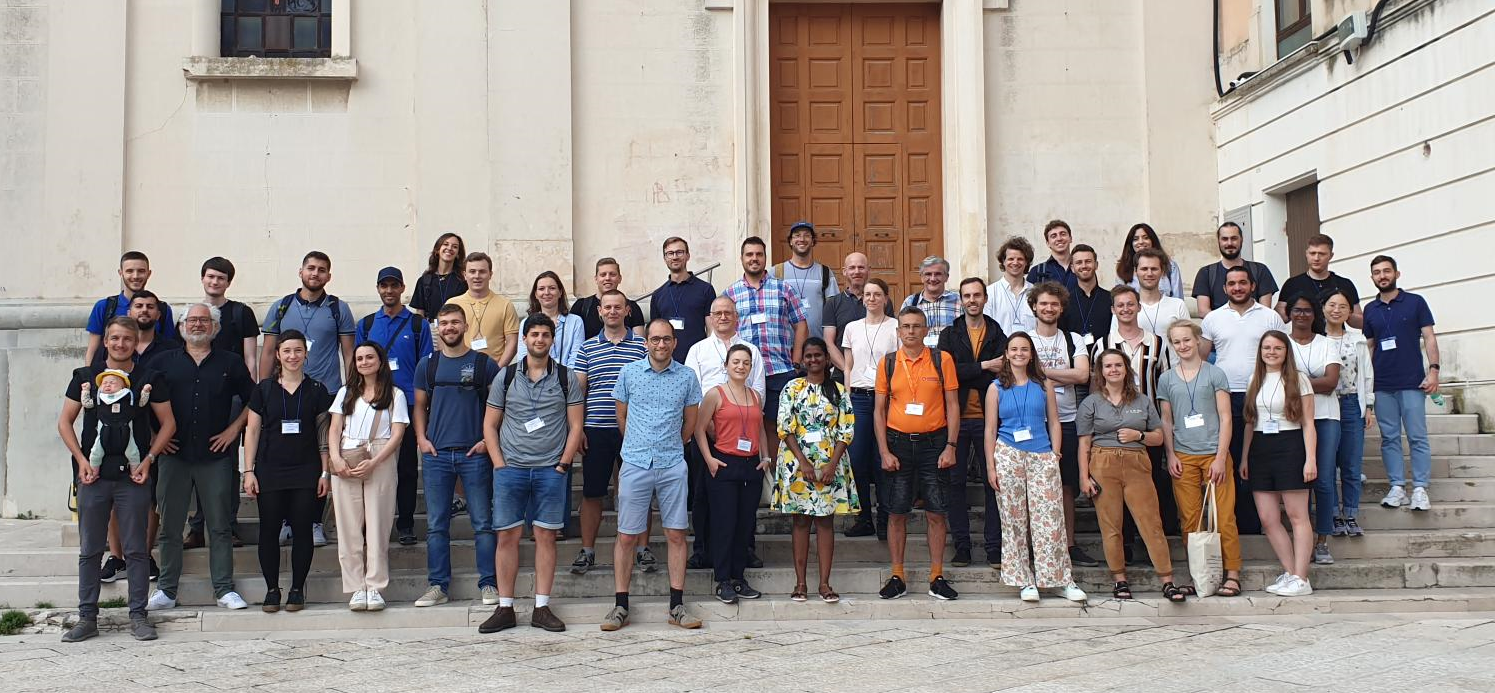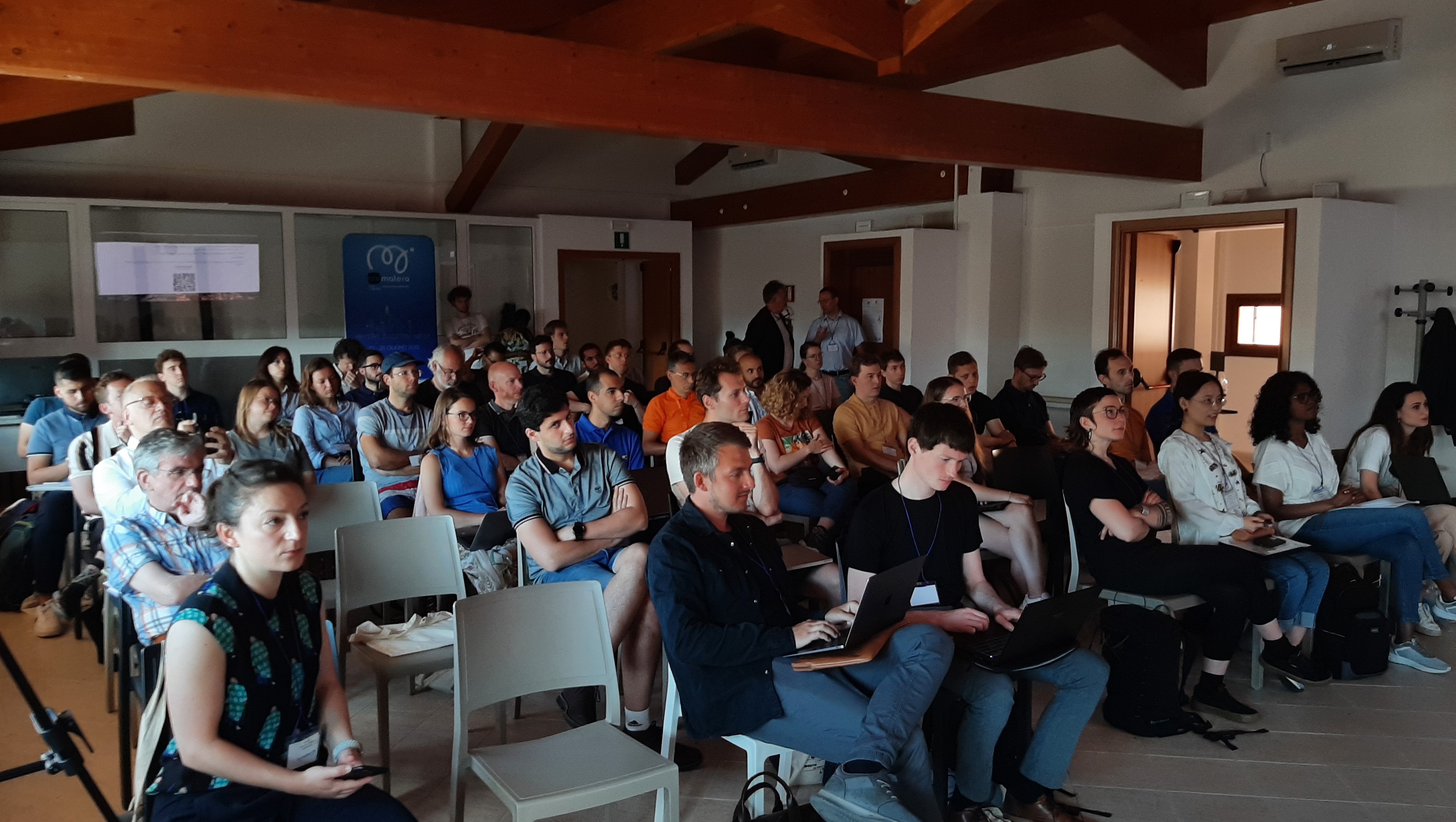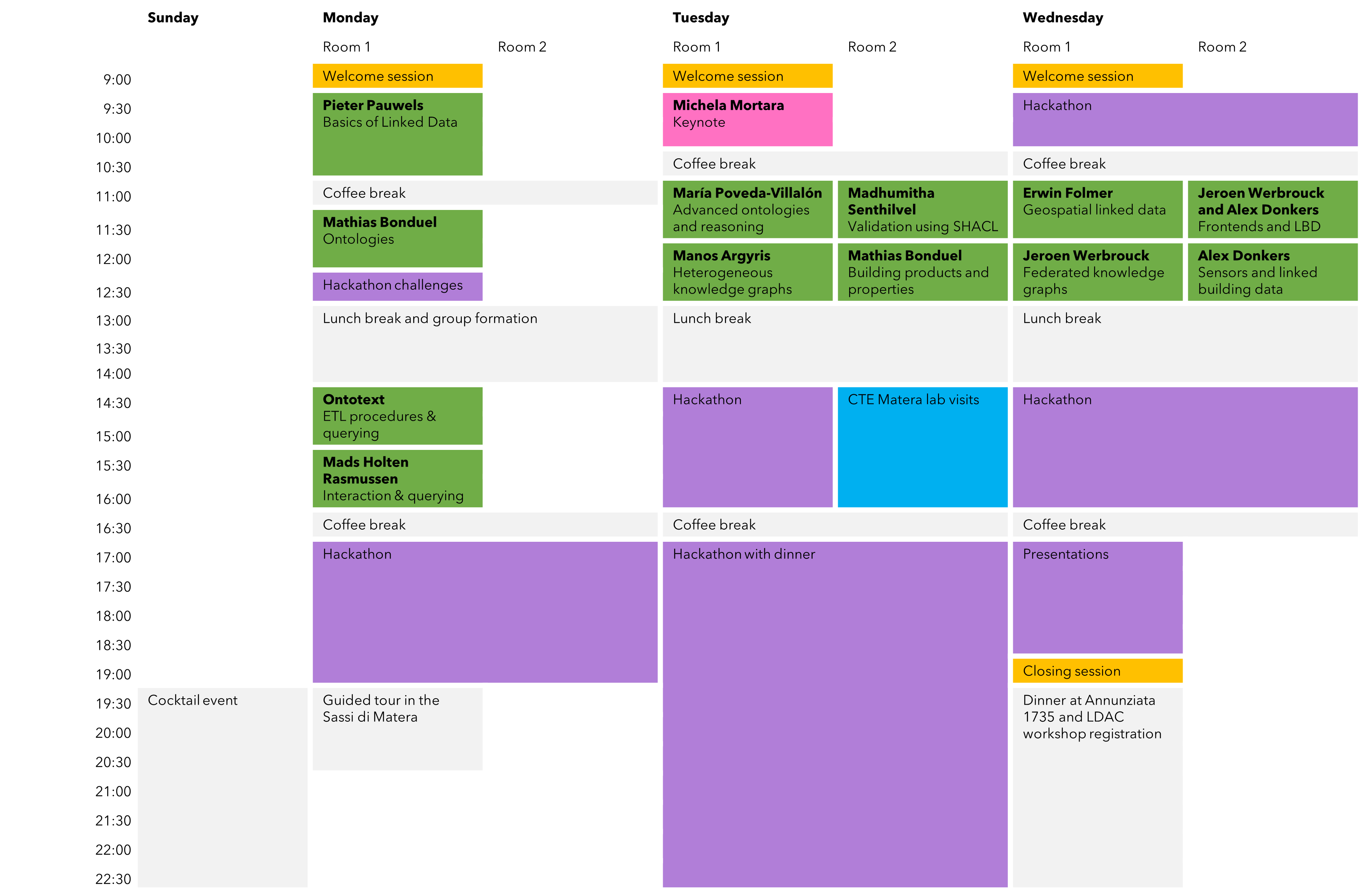


This year, the third LDAC Summer School dedicated to the application of semantic web, linked data and web of data technologies in architecture, engineering and construction (AEC) is hosted in Matera, Italy. Considering the growing interest in these technologies from the AEC industry, this Summer School will provide a starting point for participants that are new to the topic entirely and the opportunity to enhance the understanding and overview of implementations and approaches in the built environment for participants that wish to deepen their knowledge in this field.
The Summer School brings together experts and researchers on this topic and welcomes a broad domain of participants from diverse backgrounds such as computer science, architecture, and engineering. With a mixture of lectures, personal interactions with experts in the field, hands-on exercises and coding challenges, it gives participants the opportunity to explore the possibilities of the semantic web, linked data and web of data technologies for their own research and practice needs in their individual pace and depth.

The aim of the LDAC Summer School is to introduce participants to the principles of the Semantic Web and potential as well as implemented applications of it in the architecture, engineering and construction domain. It provides an overview of the technology behind it and current trends in ongoing research in this area, focusing on:
You should attend this Summer School, if you are interested in:
The LDAC Summer School is tailored for:

Michela Mortara is a senior researcher at CNR – IMATI Genova, working within the Shape Modelling Group. She graduated in Computer Science and received a PhD in Robotics from the University of Genova. Her research activities lie in the fields of Computer Graphics and geometric modelling, aiming at representing objects and phenomena characterised by a three-dimensional nature, and processing their shape in the digital domain for a variety of applications, e.g., monitoring, conservation, deformation. In particular, her expertise is in the analysis, structuring and understanding of digital shapes to extract knowledge implicitly embedded in the geometry. She is also interested in linking semantics to geometry elements (attributes, functionality, meaning in a context). Applications include automatic identification of salient parts, semantic rendering and automatic selection of the best view of 3D objects, virtual 3D scenes for edutainment and serious games. More recently she is working on 3D modelling for geoscience and urban intelligence, with applications to environmental monitoring and urban digital twins.
The LDAC Summer School will take place at the Casa delle Tecnologie Emergenti in Matera, Italy, from June 12 to 14, 2023. These three days will be filled with lectures, hands-on tutorial sessions and guided hackathon sessions where you'll work on coding challenges together with other participants! All days will involve lectures and guided hands-on sessions from 9:00 to 19:00 CEST, followed by the possibility to work on the coding challenge in late-evenings and night hackathons at the same venue with lecturers and tutors available for help.
The sessions in the main conference room can be followed using a Live Stream in Teams. This is a one-directional broadcast only. The recordings will remain available online for later viewing. All relevant links can be found in the LDAC Summer School program below.
The LDAC Summer School program follows the below schedule.

Sunday 11 June |
|
| 20:00 - 21:30: | Welcome cocktail |
Monday 12 June |
|
| 08:30 - 09:00: | Registration at the Casa delle Tecnologie Emergenti in Matera |
| 09:00 - 09:30: | Opening session Presentation Jeroen Werbrouck, Madhumitha Senthilvel, Alex Donkers |
| 09:30 - 11:00: | Lecture session: Basics of Linked Data 💻 Recording - Presentation Pieter Pauwels |
| 11:00 - 11:30: | Coffee break |
| 11:30 - 12:30: | Lecture session: Ontologies 💻 Recording - Presentation Mathias Bonduel |
| 12:30 - 13:00: | Hackathon: Introducing the challenges |
| 13:00 - 14:30: | Lunch break and hackathon group formation |
| 14:30 - 15:30: | Lecture session: ETL procedures & querying 💻 Recording - Presentation 1 - Presentation 2 - Semantic bSDD Vladimir Alexiev, Ontotext |
| 15:30 - 16:30: | Lecture session: Interaction and querying 💻 Recording - Presentation Mads Holten Rasmussen |
| 16:30 - 17:00: | Coffee break |
| 17:00 - 19:00: | Ready to rumble: the hackathon starts! |
| 19:00 - 20:30: | Guided tour to the Sassi |
Tuesday 13 June |
|
| 09:00 - 09:30: | Opening session Jeroen Werbrouck, Madhumitha Senthilvel, Alex Donkers |
| 09:30 - 10:30: | Keynote session: Michela Mortara Shape and Semantics for urban modelling – the role of geometry in city digital twins 💻 Recording - Presentation This talk will describe the current computer graphics approaches to construct a digital 3D representation of an urban context from real data. The geometric model is a set of undifferentiated elements, but represents specific urban entities with attributes, relations, functionality and meaning. Identifying the salient elements and linking semantic information to their geometric counterpart leverages automatic reasoning (multi-disciplinary optimization, monitoring, planning, simulation, prediction) on the city and its processes, as far as knowledge about land and urban morphology is concerned. The main focus will be on the acquisition of real 3D data, the reconstruction process and the semantic annotation of the 3D digital model. Examples of use cases that the geometric layer of the urban digital twin can answer to will be discussed from ongoing projects with Matera and Catania. Challenges and future directions will conclude the talk. |
| 10:30 - 11:00: | Coffee break |
| 11:00 - 12:00: | Room 1: Lecture session: Advanced ontologies and reasoning 💻 Recording - Presentation
María Poveda-Villalón Room 2: Lecture session: Validation using SHACL Git Tutorial - Presentation Madhumitha Senthilvel |
| 12:00 - 13:00: | Room 1: Lecture session: Heterogeneous knowledge graphs 💻 Recording - Git Tutorial
Manos Argyris Room 2: Lecture session: Building products and properties Presentation Mathias Bonduel |
| 13:00 - 14:30: | Lunch |
| 14:30 - 16:30: | Hackathon |
| 16:30 - 17:00: | Coffee break |
| 17:00 - 23:00: | Hackathon with dinner |
Wednesday 14 June |
|
| 09:00 - 09:30: | Opening session Jeroen Werbrouck, Madhumitha Senthilvel, Alex Donkers |
| 09:30 - 10:30: | Hackathon |
| 10:30 - 11:00: | Coffee break |
| 11:00 - 12:00: |
Room 1: Lecture session: Geospatial linked data 💻 Recording - Presentation
Erwin Folmer Room 2: Lecture session: Frontend development using linked data 💻 Recording - Git Repository - Presentation Jeroen Werbrouck & Alex Donkers |
| 12:00 - 13:00: |
Room 1: Lecture session: Federated knowledge graphs 💻 Recording - Git Repository - Presentation
Jeroen Werbrouck Room 2: Lecture session: Sensors and linked building data 💻 Recording - Presentation Alex Donkers |
| 13:00 - 14:00: | Lunch - Room 24 on Floor 3 |
| 14:00 - 15:45: | Hackathon Room 1 Ground Floor: bSDD Session 💻 Recording Artur Tomczak, Vladimir Alexiev |
| 15:45 - 16:15: | Coffee break |
| 16:15 - 18:30: | Final Presentations and Closing Session Closing Presentation Jeroen Werbrouck, Madhumitha Senthilvel, Alex Donkers |
| 20:00 - 23:00: | Dinner at Annunziata 1735 |
Thursday 15 June & Friday 16 June |
|
| 11th Linked Data in Architecture and Construction Workshop 2023 After three exciting days of Summer School, Matera will be hosting the 11th LDAC workshop. Researchers from all over the world will join us in the Casa delle Tecnologie Emergenti to present their latest insights in semantic web, linked data and web of data technologies for architecture and construction! You are very welcome to join the LDAC workshop and become part of this international group of researchers. | |
An integral part of the summer school is the application and strengthening of newly learned knowledge from lectures in practical research work: The Hackathon.

The goal of the hackathon is for participants, grouped in interdisciplinary teams, to address and define real world problems. The teams build lightweight applications enabling enrichment, querying and browsing of Linked Building Data sets, cross-domain data exploration and reasoning, generate own small test data sets and formalize existing data sets using adapters.
As a field of study, open data sets are provided as a playground for participants and can be augmented by own data sets. A suite of open-source tools are introduced to perform related tasks and form in combination with the support of the tutors the initial spark create something new.
Challenge owners and mentors will be present to help the teams with practical knowledge and hands-on challenges.
To enable the Summer School to meet the participants’ individual expectations and ensure a satisfactory staff-student ratio, the Summer School will open for a limited audience of 40 participants (first come, first serve).
Registration for the summer school opens on 23th January 2023. You can register for summer school only, or summer school and workshop. Early bird registration ends on 14th April, and regular registration starts on 15th April. The following registration options are provided:
The registration for the Summer School is subject to approval by the Organizing Committee. If you register for the Summer School, please wait for the feedback before registering for the Workshop. Important: the summer school has sold out; all seats are taken. No further registration is possible. Participants of the summer school can still register for the workshop.
The Third Summer School of Linked Data in Architecture and Construction will be held at Matera in the Basilicata region in Southern Italy. The city lies within two canyons and is renowned for the Sassi, a complex of prehistorical cave dwellings which is named a UNESCO World Heritage Site. Matera is located at a 65km drive from Bari.
The LDAC Summer School and Workshop will take place at Casa delle Tecnologie Emergenti (CTE), which is located in the center of Matera, near the Piazza San Giovanni. CTE Matera is a local center of technological innovation and emerging technologies, such as Blockchain, Artificial Intelligence (AI), Internet of Things (IoT). The CTE Matera is set up and supported by Università della Basilicata, Politecnico di Bari and Consiglio Nazionale delle Ricerche (CNR).

Throughout the week, several social events are planned, both for the summer school and workshop. An overview of locations and times can be found in the below map and in the attached PDF document. While we will provide instructions and help on-site, the welcome cocktail is a place that you need to search and find for yourself.
There are multiple airports from which you can reach Matera. The nearest airport is the Karol Wojtyla airport (BRI) in Bari. There are multiple options to reach Matera from Bari. First, you can take the Pugliairbus, which departs from Bari airport multiple times a day. The estimated time of the trip is 1 hour and 15 minutes. You can also take a 20-minute train ride to Bari Centrale and take the MarinoBus to Matera, which is a 1 hour and 20 minute ride.
A second option is the Salento Airport (BDS) in Brindisi. The trip from Brindisi to Matera is a little more challenging. The easiest option is to travel to the airport of Bari first using Pugliairbus, which departs from Brindisi Airport and brings you to Bari airport in 1 hour and 40 minutes. Once arrived in Bari, you can take a second Pugliairbus to Matera, which is a 1 hour and 15 minute trip. Next to reaching Bari by bus, one can also go there by train (RV 4404 to Bari Centrale), after which you can either take the MarinoBus to Matera or travel further to Bari airport by train (FR2 Corato) and take the Pugliairbus.
A third option is Naples Capodichino International Airport (NAP). There is no direct connection from Naples to Matera. You can either first travel to Bari by train and take one of the options mentioned above, travel with MarinoBus (via Bari) or travel to Foggia using FlixBus and continue to Matera using MarinoBus.
Rooms (single, double with single beds, triple with single beds, double) can be booked at Casa per Ferie Sant’Anna at a discounted price of 37€ per person per night. The cost includes breakfast and local tax.
Please note that these rooms are available only for 3 nights, with check-in on 12th June and check-out on 15th June. You can book a room by writing an email and specifying the reservation code LDAC2023 by 30th April 2023.
Casa per Ferie Sant’Anna
Via Lanera, 14 – 75100 Matera (Italy)
phone: +39 0835 33 34 62
email: santanna.matera[AT]gmail.com
web: www.santannamatera.it
A bed in a hostel room can be booked at Fra i sassi residence at a discounted price of 23€ per person per night (+2€ for local tax). Breakfast is optional and costs additional 5€.
Beds are available with check-in on 11th June and check-out on 16th June, but a shorter period can be agreed. You can book a room by writing an email and specifying the reservation code Elledac 2023 by 30th April 2023.
Fra i sassi residence
via D’Addozio 102 - 75100 Matera (Italy)
phone: +39 0835 336020
email: mail[AT]fraisassiresidence.com
web: www.fraisassiresidence.com
Rooms can be booked at Albergo Italia, specifically standard double (110€ for single use or 175€ as double room, per night per person) or superior double (125€ for single use or 190€ as double room, per night per person). The cost includes breakfast. Additional cost of 2€ per night per person for local tax, only for the first 3 nights.
Rooms are available with check-in on 11th June and check-out on 16th June, but a shorter period can be agreed.
You can book a room by writing an email and specifying the reservation code LDAC2023 by 21st April 2023.
Albergo Italia
Via Domenico Ridola, 5, 75100 Matera MT
email: info[AT]albergoitalia.it
web: www.albergoitalia.com
Rooms (double, double for single use) can be booked at San Domenico's Rooms, owned by Hotel San Domenico al Piano that is a few meters distant, at a price of 120€ (+2€ for local tax) per night per person. The cost includes breakfast.
Rooms are available with check-in on 11th June and check-out on 16th June, but a shorter period can be agreed.
You can book a room by writing an email and specifying the reservation code LDAC2023 by 19th April 2023.
San Domenico's Rooms
Via Roma 28, 75100 Matera, Italy
email: info[AT]hotelsandomenico.it
web: www.hotelsandomenico.it/san-domenicos-rooms/
LDAC2023 is looking for supporters and sponsors. If you are interested, then please have a look into our sponsor package with available options, and get in touch via ldac2023[AT]linkedbuildingdata.net.